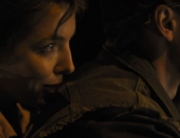Talk about your tough sell. Critics have their work cut out for them when discussing well-made but audience-repelling films. For example, Room, centered on a mother and her five-year-old son kept captive in a shed for years on end, is one of the lowest grossing films to be nominated for the best picture Oscar. The Auschwitz-set Son of Saul has earned wide acclaim, but it has performed only moderately well in limited released. Now comes Chilean director Pablo Larraín’s bristling and hard-to-forget The Club, so named for a home for priests who have committed crimes, including pedophilia.
Presumably set in the present day—no laptops or cell phones in sight—four men and one woman reside in a bubble in a small coastal town, keeping themselves apart from the neighbors. The overly bright, light-infused palette of the cinematography is one tip off that this is an environment all to itself, along with the constant ambiance of the house rattling from the wind. The simply furnished household supposedly has its daily ritual of morning chapel, mass at noon, rosary at eight (though we never see the characters at these religious activities), and dinner with wine afterwards. In the downtime, there’s always TV. The household doesn’t want for money, either; the residents profit from the winnings at the local dog races.
All five have lived together for years and have no intention of leaving, among them the petulant and boozy Father Ortega (Alejandro Goic) and the elderly Father Silva (Jaime Vadell), who served as a military chaplain during the Pinochet dictatorship. Father Ramirez (Alejandro Sieveking) has been living there since the late 1960s. He now has dementia; apparently, sexually graphic dialogue triggers his long-term memory.
The unacknowledged alpha male, and trainer of the household’s champion canine, is Vidal, played by hazel-eyed Alfredo Castro, who appeared in Larraín’s Tony Manero as a blank-eyed killer. (Castro also sent off chills in the harsh Venice winner From Afar last year; he plays the scariest men in international cinema.) And Sister Monica (Antonia Zegers) rules the roost as cook and caretaker, wearing a beatific smile that withstands threats and disturbances.
The director eschews ambiguity and goes for the jugular in what is his most emphatic film, told mostly from the camera’s omnipresent point of view and that of Father Garcia (Marcelo Alonso), a Vatican emissary sent to investigate the home after a violent incident there has caught the attention of the church. The young Jesuit questions the roommates directly to find out if they have repented and if they realize why they have been rusticated. Father Garcia’s, and the audience’s, overwhelming answer to his inquiry is a resounding no. From the moment he steps into the split-level house, four of the houseguests intuit that Garcia’s actual goal is to shut down and break up their home—and the five have plenty to say.
The film is not only arresting for its subject matter but also in how Larraín smoothly changes the tone from the subdued to the alarming. Guided by a percussive, sinewy score, the storyline briefly turns into a procedural and then morphs into a twisted revenge tale, Jacobean in its level of violence. It’s a given that the characters and their actions, past and present, would be alarming, but the film becomes disturbing in a manner that is shockingly unpredictable.
The Club is the flip side of Spotlight. Whereas that sensitive film takes the viewer step-by-step through the Boston Globe’s investigation of sexual abuse and the cover-up within the Catholic diocese of Boston, The Club doesn’t hold back. At the conclusion of Spotlight, there’s at least a sense of resolution—that the truth has finally been exposed. After The Club, you’ll feel like taking a long shower because of its unchecked self-interest and moral compromise: Father Garcia is not the crusader that he initially appears to be. The two films share at least one characteristic, though; the abusers are oblivious to their actions and justify their past by creating their own elastic rationale. (As part of Father Silva’s self-serving justification, he condones the kidnapping of poor children for middle-class adoption.)
As in his previous films, Larraín paints a broad, corrosive portrait of Chile. Tony Manero and Post Mortem were set in the recent past under the shadow of Pinochet, whose presence also looms large here. There’s a lot going on in The Club, yet all strands bolster Larraín’s deeply cynical reflection of his country.







Leave A Comment